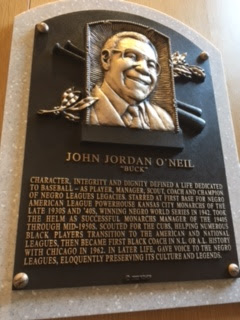 |
| Via Yelp |
The drive to Cooperstown is beautiful, to be sure, and the town itself quite charming. Parking, however, is a nightmare - the Hall was built in an era when most were expected to visit via train so no on-site lot. Fortunately, I left myself plenty of time for lunch before my 12:30 timed entrance. Neither food nor drink is allowed in the museum itself so fueling up beforehand was essential. Sal's, across the street, suited my purposes just fine. New York-style pizza with Boston Red Sox decor. Given my hunger, I could forgive them for the latter. My slice of ham/pineapple and bottled water were rather extortionately priced at $9 but then again, it was cheaper than my Scottish Bistro dinner on the drive home. Service was friendly and I didn't have to wait long.
 |
| via Wikipedia |
The Hall itself was... fine. It's smaller than I was expecting. Going in, I was particularly keen to see the exhibits about the Negro Leagues and women in baseball. There's one about Latin American players, too, that I didn't know about ahead of time. All were... fine, yet inadequate. At this point, I'm fairly well-read on the subject of baseball so I can't say I learned much I didn't already know. I'm glad to have gone but don't know if I'd ever bother again.
It's possible I just wanted a more contemplative atmosphere than was possible the day I visited. We went to the Rock and Roll Hall in Cleveland a few years back and that was a lot more satisfying. I may simply have a more emotional attachment to music than I do to sports. Furthermore, most of the other patrons in Cooperstown were middle school-aged boys in town for a tournament. So, it felt a little like work - not what I needed. If I do ever go again, maybe it would be better to go outside of high season.
There was one plaque I particularly wanted to see. After hunting down all of the enshrined Orioles (there are six), I found Buck O'Neil. O'Neil, who passed away in 2006, was finally inducted this year. He spent his entire playing career in the Negro Leagues but made it to The Show as the first Black coach in the Major Leagues. Perhaps more important to his long-term legacy, he was an eloquent ambassador for the sport, using his master storytelling skills to share the history of the Negro Leagues with future generations. Anyone who has watched Ken Burns's Baseball documentary series would recognize his warm, rich, baritone delivery. If you want to know more about my affection for this elegant gentleman, please read this post.

I have always wanted to go to Cooperstown, but didn't make it even when living on the other end of NY state. Thanks for talking us along virtually.
ReplyDeleteMy pleasure. I hope you make it someday.
Delete